|
|
|
Sort Order |
|
|
|
Items / Page
|
|
|
|
|
|
|
| Srl | Item |
| 1 |
ID:
152739
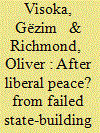

|
|
|
|
|
| Summary/Abstract |
Attempts to build a liberal peace and a concurrent neoliberal state in Kosovo have not managed to produce a sustainable and emancipatory peace. Instead, they have produced a local and negative hybrid peace that has been co-opted by the dynamics of local state formation and state contestation. These dynamics have overshadowed a meaningful transition from ethnic hostility to sustainable peace that should encompass pluralism, security, law, rights, and liberal institutions. This article examines this emergence of a negative hybrid peace and explores the prospects for a more emancipatory peace based on a local pro-peace infrastructure that avoids the pitfalls of liberal peace in practice.
|
|
|
|
|
|
|
|
|
|
|
|
|
|
|
|
| 2 |
ID:
137636
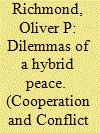

|
|
|
|
|
| Summary/Abstract |
Hybrid forms of peace represent a juxtaposition between international norms and interests and local forms of agency and identity. A first stage may be tense forms of hybrid politics that maintain structural violence, fail to resolve the contradictions between local and international norms, and reflect the outsourcing of colonial style rule. This could be characterised as, or lead to, a negative form of hybrid peace. A positive form of hybrid peace would have the advantage of having resolved such contradictions through active rather than passive everyday agency. This article examines this range of dilemmas surrounding debates about hybrid peace.
|
|
|
|
|
|
|
|
|
|
|
|
|
|
|
|
| 3 |
ID:
133706
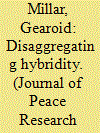

|
|
|
|
|
| Publication |
2014.
|
| Summary/Abstract |
The term 'hybrid' has been widely incorporated into recent peacebuilding scholarship to describe an array of peacebuilding endeavors, including hybrid peacekeeping missions, hybrid criminal tribunals, hybrid governance, and the hybrid peace. However, while widely deployed, hybridity itself is under-theorized and variably applied by scholars. Major concerns arise, therefore, concerning the concept's usefulness for peacebuilding theory, policy, and practice. Most problematically, while some scholars use hybridity descriptively to illustrate the mixing of international and local institutions, practices, rituals, and concepts, many today deploy hybridity prescriptively, implying that international actors can plan and administer hybridity to foster predictable social experiences in complex post-conflict states. This latter literature, therefore, assumes predictable relationships between the administration of hybrid institutions - of law, of governance, or of economics, for example - and the provision of peace-promoting local experiences of those institutions - experiences of justice, authority, empowerment, etc. This article argues that these assumptions are flawed and illustrates how a disaggregated theory of hybridity can avoid such errors. This theory distinguishes between four levels of hybridity - institutional, practical, ritual, and conceptual - characterized by their variable amenability to purposeful administration. The article illustrates how prescriptive approaches that assume direct and predictable relationships between institutions and experiences fail to recognize that concepts underpin local understandings and experiences of the world and, therefore, play a mediating role between institutions and experiences. Using examples from Sierra Leone, the article shows that while concepts are always hybrid, conceptual hybridity is inherently resistant to planned administration. As a result, internationally planned and administered hybrid institutions will not result in predictable experiences and may even result in negative or conflict-promoting experiences. The article illustrates the dangers of assuming any predictable relationships between the four levels of hybridity, and, therefore, between the administration of institutional hybrids and the predictable provision of positive local experiences.
|
|
|
|
|
|
|
|
|
|
|
|
|
|
|
|
| 4 |
ID:
114539
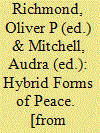

|
|
|
|
|
| Publication |
United Kingdom, Palgrave Macmillan, 2012.
|
| Description |
x, 311p.Hbk
|
| Series |
Rethinking Peace and Conflict Studies
|
| Standard Number |
9780230282285
|
|
|
|
|
|
|
|
|
|
|
|
Copies: C:1/I:0,R:0,Q:0
Circulation
| Accession# | Call# | Current Location | Status | Policy | Location |
| 056793 | 327.172/RIC 056793 | Main | On Shelf | General | |
|
|
|
|
| 5 |
ID:
163055
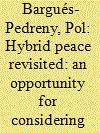

|
|
|
|
|
| Summary/Abstract |
Critical peacebuilding scholars have focused on the impact of the encounter between the ‘local’ and the ‘international’, framing the notion of ‘hybridity’ as a conceptual mirror to the reality of such encounter. This paper explores a dual aspect of hybridity to highlight a tension. Understood as a descriptor of contingent realities that emerge after the international–local encounter, hybridity requires acknowledging that peacebuilders can do little to shape the course of events. Yet, framed as a process that can enable the pursuit of empowering solutions embedded in plurality and relationality, hybridity encourages forms of interventionism that may perpetuate the binaries and exclusions usually associated to the liberal peace paradigm. The paper suggests that when hybridity is used to improve peacebuilding practice, an opportunity may be missed to open up this tension and analytically discuss options, including withdrawal which, whilst largely left out of the conceptual picture, may be relevant to calls for reclaiming the self-governance of the subjects of peacebuilding themselves.
|
|
|
|
|
|
|
|
|
|
|
|
|
|
|
|
| 6 |
ID:
116875
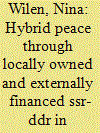

|
|
|
|
|
| Publication |
2012.
|
| Summary/Abstract |
This article aims to critically examine Rwanda's security sector reform and disarmament, demobilisation and reintegration (ssr-ddr) process through a theoretical framework outlining four different models of peace processes in order to identify the sort of peace that can emerge from Rwanda's ssr-ddr approach. The author analyses how the Rwandan government has managed to keep the process 'locally' owned, while largely financed by external actors, despite strong criticism of its apparent lack of democratisation. The 'genocide credit', the Rwandan government's preference for national, rather than international solutions and its recent troop contribution to peacebuilding operations in the region are identified as the main reasons for this development. The paper argues that the peace emanating from the ssr-ddr process may be considered a hybrid form of state formation and state building, because of the local agency's preference for security and stability while simultaneously enjoying financial and technocratic support for its 'liberal' peacebuilding actions in the region.
|
|
|
|
|
|
|
|
|
|
|
|
|
|
|
|
| 7 |
ID:
163054
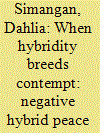

|
|
|
|
|
| Summary/Abstract |
This paper examines the unresolved tensions from international/liberal-local encounters during Cambodia’s post-conflict peacebuilding in the areas of governance and justice. The quick introduction but weak implementation of international/liberal norms and institutions enabled the local elite to contextualise, negotiate, resist and reject those international/liberal norms and institutions to preserve an elite-centred status quo. The outcome of these international/liberal-local encounters is a negative hybrid peace in which peace is neither liberal nor emancipatory. The analysis in this paper contributes to the discussion on hybridity in peacebuilding by describing the characteristics, explaining the formation process and tracing the long-term consequences of negative hybrid peace
|
|
|
|
|
|
|
|
|
|
|
|
|
|
|
|
|
|
|
|
|